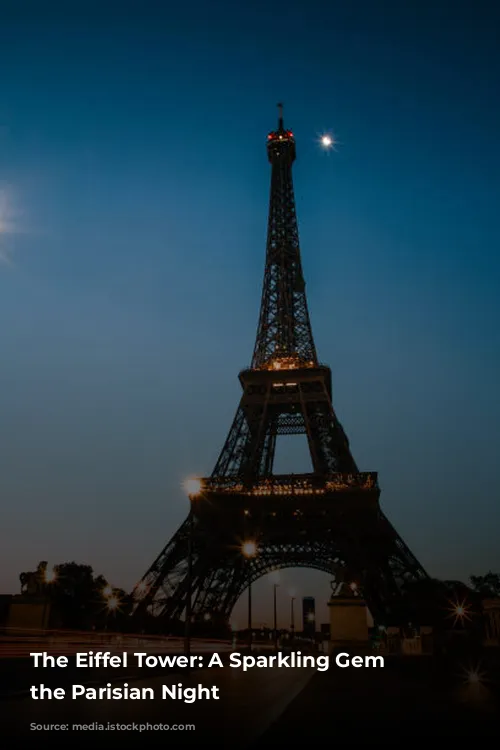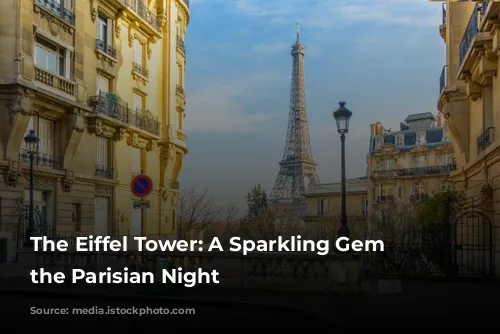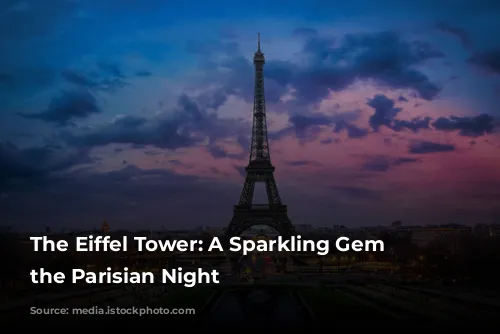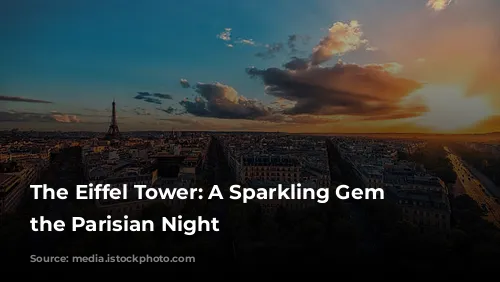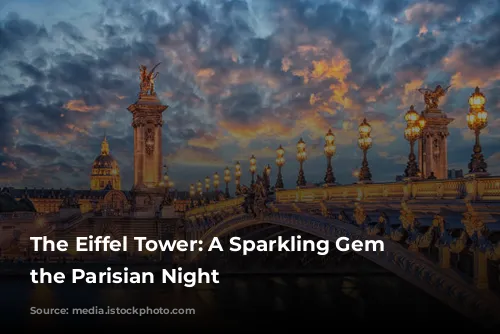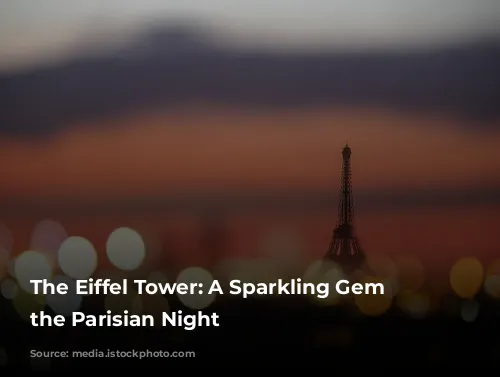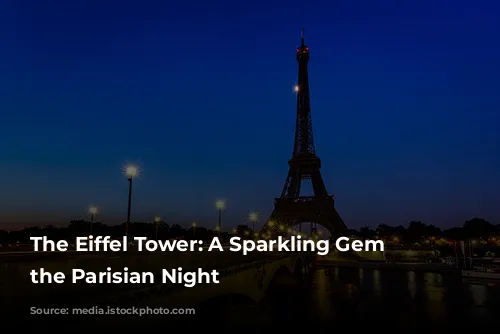Imagine Paris as the sun dips below the horizon. The city transforms, its iconic monuments and bustling streets glowing with a warm, inviting light. But there’s one star that outshines them all – the Eiffel Tower. This magnificent structure, a beacon of Parisian pride, transforms into a mesmerizing spectacle after dark, captivating visitors with its dazzling lights and mesmerizing sparkles.
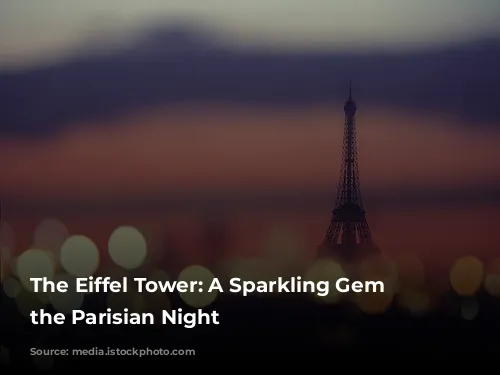
The Iron Lady’s Sparkling Transformation
From the moment it was built for the 1889 World’s Fair, the Eiffel Tower has been illuminated. But it wasn’t always the golden spectacle we see today. Initially, the tower relied on gas-powered projectors, illuminating the “Iron Lady” with over 10,000 gas burners.
A decade later, electricity replaced gas, with over 5,000 light bulbs integrated directly into the tower’s structure. This innovation not only enhanced nighttime access but also showcased the tower’s intricate design.
The Eiffel Tower’s iconic golden glow was born in 1985. A major restoration brought a new lighting scheme, and in 2000, the tower debuted its mesmerizing sparkles for the new millennium. This seemingly temporary addition quickly became a permanent fixture, adding another layer of magic to the Parisian night.
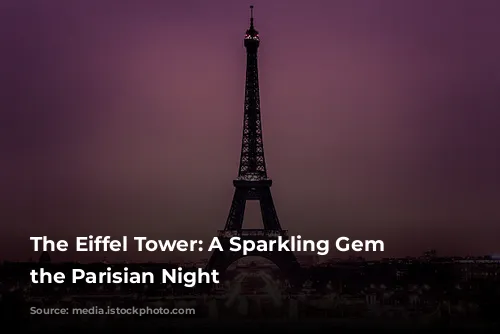
The Eiffel Tower’s Sparkling Schedule
Every evening, the Eiffel Tower’s golden lights turn on as darkness descends. The tower then embarks on a 5-minute sparkle show at the top of every hour. So, if the sun sets at 8:20 p.m., the tower will illuminate in its golden hue shortly after, with the first sparkle show commencing at 9 p.m.
The tower’s lighthouse, a beacon of light, also illuminates and begins its rotation at nightfall.
In line with Paris’ energy conservation efforts, all the Eiffel Tower’s lights are turned off at 11:45 p.m. The last sparkle show occurs at 11 p.m. However, during summer, the tower remains open until 12:45 a.m., extending the lighting and lighthouse operations until 1 a.m.
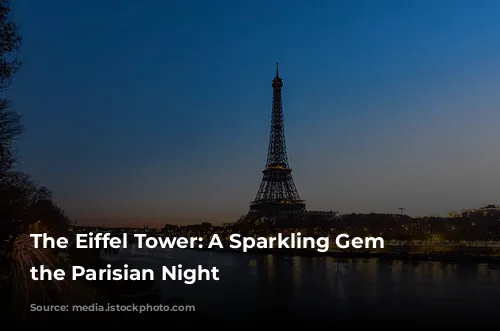
Energy Efficiency: A Sparkling Commitment
The Eiffel Tower’s energy consumption has been a focus for years. In 2004, the power of the projectors was reduced by 40%, achieving a 4% reduction in the tower’s overall energy usage.
The sparkle shows were also adjusted in 2008, shortening the duration from 10 to 5 minutes, further reducing the tower’s environmental impact.
The 20,000 xenon bulbs used for the sparkle shows consume a negligible amount of energy, representing just 0.4% of the tower’s energy costs. These figures have been continually refined, thanks to the energy sobriety plan, which now sees the nighttime sparkle shows end at 11 p.m.
Since 2016, the Eiffel Tower’s lighting has achieved remarkable energy improvements, boasting an average annual reduction in energy consumption of 9%.
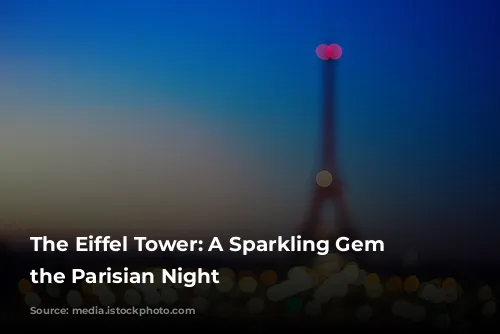
The Eiffel Tower’s Iconic Lighthouse
From its inauguration in 1889, a lighthouse adorned the Eiffel Tower’s summit. Its purpose was to illuminate key Parisian landmarks, including the Arc de Triomphe, the Opéra Garnier, and the Louvre Museum. In 1947, the lighthouse was repurposed for aerial navigation.
Today, the Eiffel Tower’s lighthouse stands as a universal symbol. It underwent a transformation in 2000, adopting its current form with two electrical harnesses boasting an 80-kilometer range.
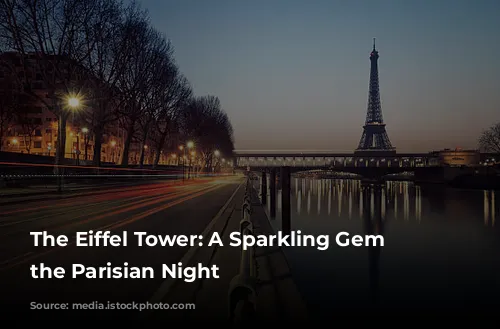
A Nighttime Adventure: Exploring the Eiffel Tower After Dark
As the day winds down, the Eiffel Tower transforms under its golden glow. A nighttime visit offers a unique perspective, allowing you to experience the tower in a new light.
For an unforgettable experience, consider taking the stairs to the top. The illuminated structure creates an intimate atmosphere, showcasing the tower’s elegance from a different angle.
If you’re lucky enough to catch the sunset, head to the top floor and enjoy a glass of champagne at the champagne bar. For a romantic dinner with breathtaking views of the city, reserve a table at Madame Brasserie on the first floor or the Michelin-starred Jules Verne restaurant on the second floor.
To immerse yourself in the magic of the Eiffel Tower’s sparkles, arrive shortly after nightfall. The second floor offers an unparalleled vantage point, where you’ll be surrounded by the golden glow and can gaze up at the tower’s glittering spire.
If you’re looking for stunning panoramic views of Paris or a chance to witness the lighthouse in action, venture to the top of the tower.
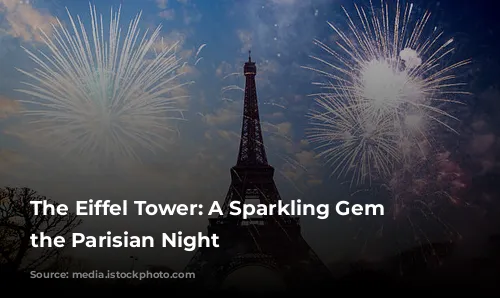
Capturing the Magic: Photography and More
The Eiffel Tower’s dazzling nighttime display begs to be captured. Feel free to photograph or film the tower’s golden light and sparkling spectacle. Share your memories on social media, spreading the magic of the Eiffel Tower with the world.
However, for professional photographers, the law regarding the tower’s nighttime illumination differs. The tower’s golden glow and sparkles are protected by copyright. To utilize the tower’s image commercially, you’ll need authorization from the Société d’Exploitation de la Tour Eiffel.
A day or night visit to the Eiffel Tower offers distinct experiences. The tower’s golden glow transforms the nighttime visit into an unforgettable and magical adventure.
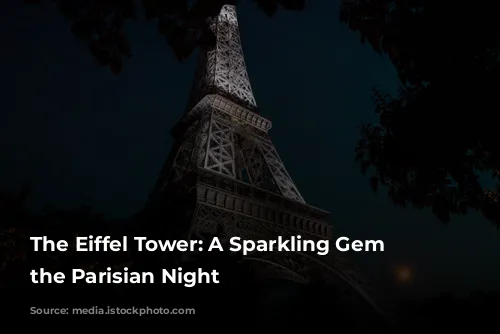
Unraveling the History: The Eiffel Tower’s Legacy
The Eiffel Tower is much more than a breathtaking structure. It’s a symbol of Paris, a testament to human ingenuity, and a reminder of the city’s rich history. Learn more about the tower’s fascinating history and discover the stories behind this iconic landmark.
